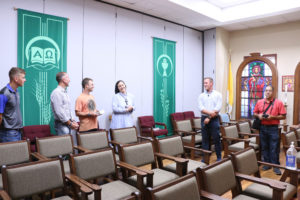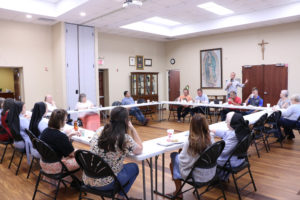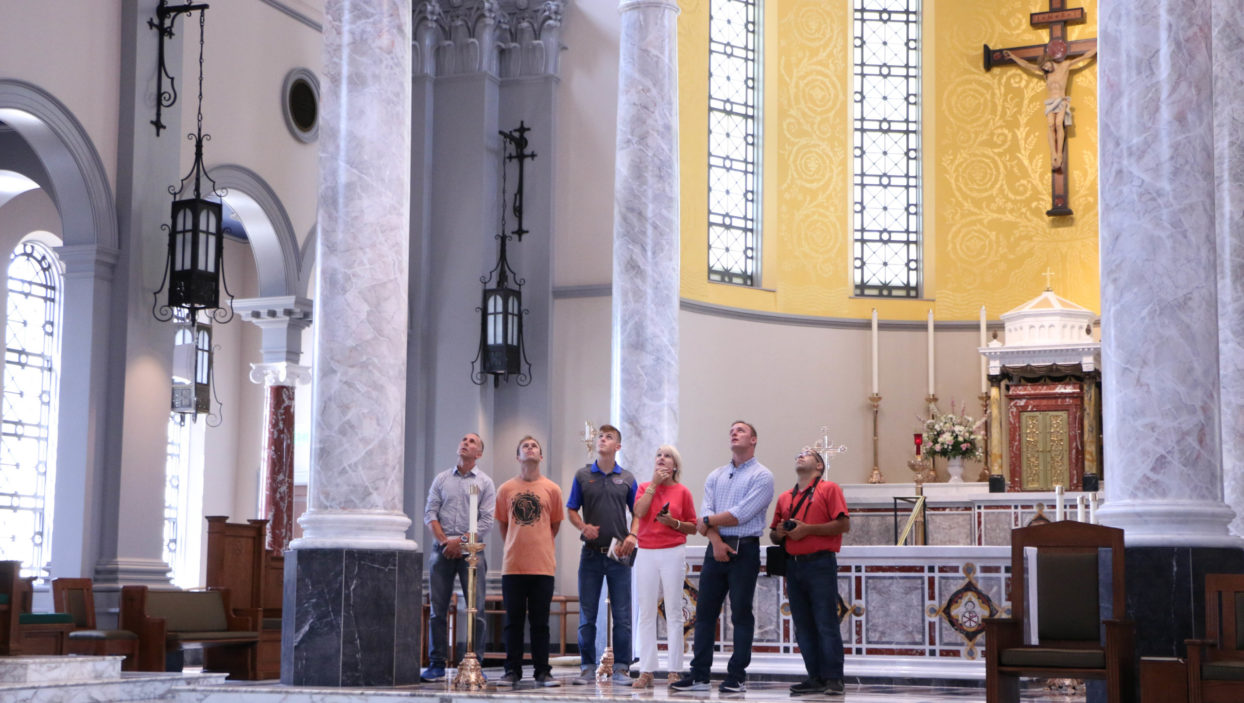Comunità Cenacolo considering Diocese of Knoxville for fifth U.S. house
By Bill Brewer
Five men who visited the Diocese of Knoxville in June could easily have been mistaken for Catholic tourists taking in East Tennessee and all it has to offer.
But there was more to their trip than hiking in the Great Smoky Mountains National Park.
A potential ministry was at the forefront of the weeklong tour by members of Comunità Cenacolo, a faith-based community founded by Mother Elvira Petrozzi, an Italian religious who believes that prayer and the sacraments can heal the deep emotional wounds that lead many young men and women down the path of drugs and other destructive addictions.
The Comunità Cenacolo (Community of the Cenacle) name refers to the Upper Room, where Christ and his disciples gathered for the Last Supper and where the Holy Spirit later descended upon the 12 Apostles and Mary at Pentecost.
In 1983, Mother Elvira, a Sister of Charity, opened the first Comunità Cenacolo home in Italy. A decade later, Our Lady of Hope residence for men was established in St. Augustine, Fla., and there are now four homes in the United States—three in St. Augustine and one in Hanceville, Ala., near where the Shrine of the Blessed Sacrament and Our Lady of the Angels Monastery are located.
The members of Comunità Cenacolo fraternity—Jason Haig, Luke Crouse, Michael Cimino, Clifford Hearn, and Nick Carlin—allowed people in the Knoxville diocese to get to know them as they got to know the Catholic Church in East Tennessee and assessed the diocese’s interest in hosting a Comunità Cenacolo home.
Mr. Haig, 44, is originally from South Carolina; Mr. Crouse, 25, is originally from Maryland; Mr. Cimino, 38, is originally from New Jersey; Mr. Hearn, 34, is originally from California; and Mr. Carlin, 21, is originally from Florida.
Mr. Haig, Mr. Cimino, and Mr. Carlin are with the Hanceville house, and Mr. Hearn and Mr. Crouse are with the St. Augustine location.
While in East Tennessee, they shared their stories of addiction and how Comunità Cenacolo, through its Catholic-centered support ministry, was instrumental in their turning their lives around. Now, the five men work with others who are struggling with addiction.
The men met with Bishop Richard F. Stika on June 19 and also met with Paul Simoneau, vice chancellor for administration and director of the Office of Justice and Peace for the diocese, on June 14.

Sister Maria Juan Anderson, RSM, shows the members of Comunità Cenacolo around the Chancery, including Our Lady of the Mountains Chapel.
While any decision on expanding Mother Elvira’s ministry to the Diocese of Knoxville is in the future, the Comunità Cenacolo men liked what they saw.
“It’s been good. We’ve been very blessed to come up here and try to bring the light of our community here to this part of the country and to see what the Lord might have in store for us. Also, we wanted to give testimony to God’s mercy in our lives and the beauty that is living the light of that mercy and to share our stories, and also for each other to experience that camaraderie among us brothers to have a retreat for ourselves, to work together and pray together in a different setting than our normal community life,” Mr. Crouse said.
During their week in East Tennessee in mid-June, the men also met with Cardinal Justin Rigali and attended a Mass he celebrated, they shared vespers with the Religious Sisters of Mercy of Alma, Mich., at the Sisters’ Knoxville convent, participated in work projects, took part in a eucharistic procession through downtown Knoxville, and toured different parts of the diocese, including the Cathedral of the Most Sacred Heart of Jesus.
East Tennessee is not unknown to Mr. Crouse, who has relatives living in the diocese who are Catholic church members.
“Coming up here, we had an idea of maybe bringing it (Comunità Cenacolo) here if God were to provide for us. Absolutely! But I don’t think our visit has made the decision any more so or less so. We’re the first group to come up here and see and check out East Tennessee to see what it looks like and see if there is a need,” Mr. Crouse said.
“In my time in the community, I see the need for another home. But that’s really up to our superiors and what they think. All we can do is pray and return with our experience and give that up to the Lord,” he added.
Mr. Cimino agreed that East Tennessee would be “a great place to start a new house if God wills it.”
“There is a need. There’s always a need for someplace where people can come as a refuge, to come out of the darkness, to come into the light to receive God’s mercy. Drugs, and addiction in general, are a big issue now. To be able to open a new (Comunità Cenacolo) house would be incredible work for God to do. It would be incredible,” Mr. Cimino said.
Mr. Crouse and Mr. Cimino stressed that there are needs for both men’s and women’s homes in the Comunità Cenacolo community. Mr. Crouse noted that the community is very deliberate in its decisions on establishing houses.
“We move very slow with things. We don’t really rush into anything. We just converted one of the men’s homes in Florida to a women’s home, which has been really special. It’s been cool to see how those girls have really made it their own. It’s been cool to see how God has provided for them there,” Mr. Crouse said. “There is a strong discernment process. If it’s right, it’s right. If the providence is there, it’s there. If God makes a way, that’s when we move. It just depends on the path set before us.”
The men explained that Comunità Cenacolo and its locations operate independently and do not use diocesan resources.
“Comunità Cenacolo depends and lives totally on the providence of God, who sustains us through the gifts and contributions of those who desire to help in this work of God’s mercy. We receive no government funds, diocesan funds, nor do we ask payment of anyone living in the community. We learn to live on gratitude, realizing that our joy does not depend on what we have or what we lack. We know and trust that the Father, who is rich in mercy, will give us all that we need,” according to Comunità Cenacolo’s website.
Bishop Stika said following his meeting with the five men that he’s very supportive of Comunità Cenacolo’s work and would welcome a Comunità Cenacolo house in the diocese. The bishop said the diocese is in touch with the director of Comunità Cenacolo America and looks forward to a meeting in the near future to discuss next steps.
“I spent about three hours with them. They shared their stories. They have all faced strong addictions and lost their sense of purpose in life, and through the invitation of somebody who was involved, now they are good citizens. It was very impressive spending time with them,” Bishop Stika said.
“If they do come, they would have their donors purchase a residence. We would offer them moral support. They are good friends with the retired ordinary in Birmingham, Bishop (Robert J.) Baker, who I am good friends with. He knew them from St. Augustine, Fla., where he used to serve, and where their first residence in the United States was located, so I would welcome them with open arms,” Bishop Stika added.

Jason Haig of Comunità Cenacolo America addresses members of the Diocese of Knoxville Chancery during a lunch gathering on June 14. Mr. Haig and his Comunità Cenacolo brothers shared information about their organization and their personal journeys of faith.
The bishop said there are a number of factors in appreciating what Comunità Cenacolo has accomplished.
“For one, it’s successful. It was founded by a religious sister in Italy to help those rehab their lives from addiction. They have their own lay leadership. They don’t work outside the facility, but they work in their home, they volunteer in their surrounding area and pray the rosary three times a day, and they go to Mass, they have morning prayer, and they also don’t rely on a lot of technology. They told me that when they wash clothes they use a washboard, just to show them that they can do these things. So, they are trying to rebuild the lives of people based on faith through peers,” he observed.
Life in the Comunità Cenacolo community is akin to life in a religious order.
Comunità Cenacolo selects individuals who are experienced community participants to be servants of hope and will serve as the first personal contact for those struggling with dependency interested in entering Comunità Cenacolo. The servants of hope provide general information as well as their own personal experience with the community.
If approved by a servant of hope, individuals and their families set up an appointment for a three-day orientation in St. Augustine. Candidates for entry into the community must be accompanied by parents.
The candidates pray and work with the community, living its daily schedule. At the end of the three days, the candidates meet individually with the director of Comunità Cenacolo America. The parents then meet with the director. And if the family and the community agree that Comunità Cenacolo is an appropriate answer for a candidate’s need, he or she is accepted, and an entry date is established.
On average, those being ministered to in the Comunità Cenacolo houses stay for three years, according to Mr. Crouse.
Comunità Cenacolo accepts men ages 18-40 and women ages 18-30. The community further explains that because physical labor is integral to the life of Comunità Cenacolo, the community must assess that each candidate can handle the demands of its physical working life.
In Latin America and Africa, Comunità Cenacolo also ministers to orphaned and abandoned street children as well as underprivileged youth.
There are 72 Comunità Cenacolo houses in 20 countries.
The ministry started by Mother Elvira, who is 85 and still serves the Church in Italy, is often referred to as a school of life.
“The ways young people and those who struggle come to community are often different, but all are united by suffering. They’re united by this cross, and it is not just drug addiction, but more so the inability to love and live one’s life. From the beginning, Mother Elvira loved to define the community journey as a ‘school of life,’ explaining what community wants to offer to people. Those who ask for help learn to live life in all of its different aspects: joy, pain, fatigue, friendship, celebration, simplicity, struggle, fear, courage, fragility,” according to Comunità Cenacolo America.
“The community journey is formed over time and collective experiences. We developed it by listening and learning from the young people themselves and their families. Through the experience and service of those who’ve put in the hard work, we can welcome and God can heal more hearts than ever. Over the years, this journey has become a source of hope and salvation not only for many who’ve been dependent on drugs and distractions, but also for those who crave to encounter a true answer to the suffering they have experienced. They search for a solution to the deep search for meaning in their life,” the ministry statement continued.


Comments 3
I have daughter who has a drug addiction, how can I get her to your community journey to be free from druga
Yvette, not sure your comment was answered but go to their website: www. Hopereborn.org for details. God Bless!
Hello!
So I was wondering what the success rates are for these communities?